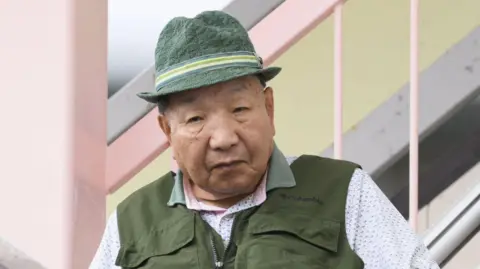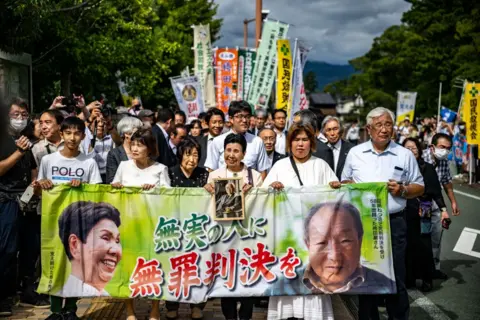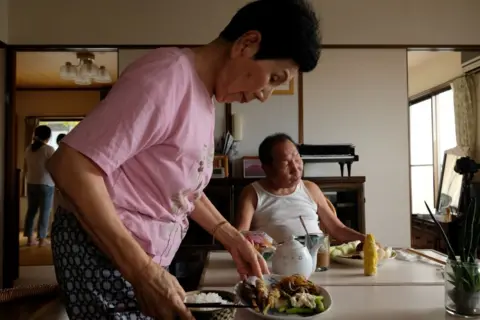 Reuters
ReutersAn 88-year-old man who is the world’s longest-serving death row inmate has been acquitted by a Japanese court, after it found that evidence used against him was fabricated.
Iwao Hakamada, who has been on death row for more than half a century, was found guilty in 1968 of killing his boss, the man’s wife and their two teenage children.
He was recently granted a retrial amid suspicions that investigators may have planted evidence that led to his conviction for quadruple murder.
More than half a century spent on death row has taken a heavy toll on Hakamada’s mental health, though, meaning he was unfit to attend the hearing where his acquittal was finally handed down.
Hakamada’s case is one of Japan’s longest and most famous legal sagas, and has attracted widespread public interest, with some 500 people lining up for seats in the courtroom in Shizuoka on Thursday.
As the verdict was handed down, Hakamada’s supporters outside the court cheered “banzai” – a Japanese exclamation that means “hurray”.
Hakamada, who was exempted from all hearings due to his deteriorated mental state, has been living under the care of his 91-year-old sister Hideko since 2014, when he was freed from jail and granted a retrial.
She fought for decades to clear his name and said it was sweet to hear the words “not guilty” in court.
“When I heard that, I was so moved and happy, I couldn’t stop crying,” she told reporters.
Her brother has previously said his battle for justice was like “fighting a bout every day”. “Once you think you can’t win, there is no path to victory,” he told AFP news agency in 2018.
‘Bloodstained’ clothes in a tank of miso
A former professional boxer, Hakamada was working at a miso processing plant in 1966 when the bodies of his employer, the man’s wife and two children were recovered from a fire at their home in Shizuoka, west of Tokyo. All four had been stabbed to death.
Authorities accused Hakamada of murdering the family, setting fire to their home and stealing 200,000 yen in cash.
Hakamada initially denied having robbed and murdered the victims, but later gave what he came to describe as a coerced confession following beatings and interrogations that lasted up to 12 hours a day.
In 1968 he was convicted of murder and arson, and sentenced to death.
 Getty Images
Getty ImagesThe decades-long legal saga ultimately turned on some clothes found in a tank of miso a year after Hakamada’s arrest. Those clothes, purportedly bloodstained, were used to incriminate him.
For years, however, Hakamada’s lawyers argued that the DNA recovered from the clothes did not match his, raising the possibility that the items belonged to someone else. The lawyers further suggested that police could have fabricated the evidence.
Their argument was enough to persuade Judge Hiroaki Murayama, who in 2014 noted that “the clothes were not those of the defendant”.
“It is unjust to detain the defendant further, as the possibility of his innocence has become clear to a respectable degree,” Murayama said at the time.
Hakamada was then released from jail and granted a retrial.
Prolonged legal proceedings meant that it took until last year for that retrial to begin – and until Thursday morning for the court to declare the verdict.
The detail upon which his retrial and final acquittal hinged was the nature of the red stains on clothing prosecutors said was his. The defence questioned how the stains had aged. It said the fact they remained red and had not darkened after an extended time immersed in soybean paste meant the evidence was fabricated.
Thursday’s ruling found that “investigators tampered with clothes by getting blood on them” which they then hid in the tank of miso, according to AFP.
Hakamada was declared innocent.
 Getty Images
Getty ImagesDecades of detention, mostly in solitary confinement with the ever-present threat of execution, have taken a heavy toll on Hakamada’s mental health, according to his lawyers and family.
His sister has long advocated for his release. Last year, when the retrial commenced, Hideko expressed relief and said “finally a weight has been lifted from my shoulders”.
Retrials for death row inmates are rare in Japan – Hakamada’s is only the fifth in Japan’s post-war history.
Along with the United States, Japan is the only G7 country that still imposes capital punishment, with death row prisoners being notified of their hanging just a few hours in advance.

